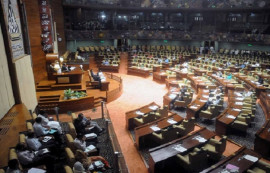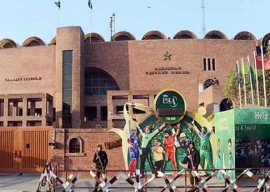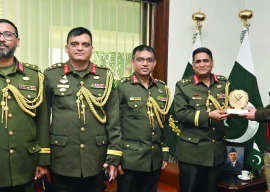
A special meeting of the Sindh cabinet presided over by Prime Minister Yousaf Raza Gilani on Monday has decided to launch ‘surgical operations’ against suspects involved in the ongoing violence in Karachi.
“We need to take action now; otherwise it will be too late and someone else would come to play their role,” the Prime Minster said.
Briefing the media after the cabinet meeting, Sindh Information Minister Sharjeel Inam Memon announced that the government’s ‘surgical operation’ in the city would not discriminate based on political affiliation.
“Police have done their homework and have identified the suspects and disturbed areas; the operation will be started very soon,” he said.
Struggling to keep it together
As he was boarding a flight to Karachi on Monday morning, if Prime Minister Gilani had hoped to sweep into the nation’s financial capital and once again play the role of a conciliator, he was about to be deeply disappointed.
It appears that the prime minister had been hoping that he would chair a special meeting of the provincial cabinet with all members of the coalition present – including the MQM and the ANP – in a display of unity against the violence that has thus far claimed over 100 lives in Karachi over the past six days. But it was not to be.
The MQM, a party that has ostensibly rejoined the ruling coalition, refused to meet him all day, showing up neither at the Sindh cabinet meeting chaired by the prime minister nor at the reception at the Governor House later in the evening, despite repeated attempts to contact them.
Even the ANP refused to attend the cabinet meeting (on grounds that the prime minister had agreed to a restoration of the 2001 elected local government system, which benefits their rival MQM). An ANP delegation led by ANP Sindh chief Shahi Syed did, however, meet the prime minister later in the day at the Chief Minister House. Almost ironically, much of the prime minister’s energies seem to have been spent mediating a conflict between his own partymen, Federal Interior Minister Rehman Malik and Sindh Senior Minister Zulfiqar Mirza.
Prime Minister Gilani appeared to be somewhat shaken by the intransigence of the various political parties. Perhaps as a consequence, his arguments against a military intervention to restore calm in the city sounded less convincing than a day earlier.
“We need to take action now. Otherwise it will be too late and someone else would come to play the role,” said the prime minister after the cabinet session, in what appears to be an allusion to military intervention, something that many politicians, and even some Karachi businessmen, have been calling for.
“We do not need army to take control of Karachi. The police and Rangers should be given a free hand against criminals in troubled areas,” he said.
The day also saw Sindh Home Minister Manzoor Wassan saying that calling in the Army could be a backup option.
(Read: Calling in the army is no solution)
The political tone in the city, however, seemed unsuitable for any of the political reconciliation that would be necessary for any crackdown to begin against the killings.
In his press conference following the cabinet meeting, Sindh Information Minister Sharjeel Inam Memon, in guarded and indirect language, blamed the MQM for the violence. The MQM, for its part, announced that it would observe a ‘day of mourning’ after the killings, effectively calling for the entire city to be shut down on Tuesday (today).
“We do not want to indulge in the practice of allegations, but everyone knows who collects hides of animals [after Eid-ul-Azha] at gunpoint and sets the precedent of collecting extortion from businessmen in Karachi,” said Memon, an allusion to allegations have been levelled in the past against the MQM.
Memon denied his party was in any way involved in the violence. However, a group that has been linked in the past with the ruling PPP, though now defunct, more or less admitted its own involvement in the target killings.
At a press conference held in Lyari, Zafar Baloch, the head of the ostensibly defunct Peoples Aman Committee blamed the entire recent upsurge in violence on the MQM but then went on to make an indirect admission of complicity.
“If the MQM can claim they have not killed any Baloch, then we too can claim we have not killed any muhajirs,” said Baloch.
(With additional reporting by Salman Siddiqui)
Published in The Express Tribune, August 23rd, 2011.
COMMENTS (16)
Comments are moderated and generally will be posted if they are on-topic and not abusive.
For more information, please see our Comments FAQ
1736920546-0/fizza-(25)1736920546-0-405x300.webp)


1731570357-0/elon-musk-(1)1731570357-0-165x106.webp)













Another meeting at the Chief Minister's House . Sheer waste of time and money. If the rangers and the police could handle the situation , why didnt the Sind Government give the orders in the first place
Prime Minster said:“We need to take action now; otherwise it will be too late and someone else would come to play their role,” May i ask "WHO IS SOMEONE" ARMY OR CJ OF PAKISTAN?
“everyone knows who collects hides of animals [after Eid-ul-Azha] at gunpoint and sets the precedent of collecting extortion from businessmen in Karachi,”
Agreed, but who set up the 'Al-zulfikar'?????
Please stop this blame game and incitement. You as minister are accountable for all deaths irrespective of ethnicity or political affiliation
How many more GOP wants to kill in surgical operations? Please quantify.
Maintaining law and order situation is the prime responsibility of the Police and the Rangers and keeps on extending its stay in Karachi one pretext or the other.
If the Police and Rangers cannot maintain law and order in Karachi then people of Karachi should not seek their help any more.
Gun licenses should be issued to any one who apply for a gun license and then it will become the responsibility of an individual person to take care of himself and his family member’s security.
I have not seen such a situation where Police and Ranges draws hefty sum of salaries from the Government and they are not available where their services are required any where when an incident of firing occurs.
Karachi needs a complete operation cleanup by the Army. It is should not restrict the operation cleanup to one or two political parties but it should act without any consideration as who is who.
When Army would move to take over Karachi, people will lodge complaints with the Army Sub-Headquarters in Karachi against the Bhata Mafia, Land Mafia, snatching of mobile phones and looting of banks.
House to house search operation is required after imposing curfew in a particular area without giving any prior notice to the residents and then search should be made to recover the illegal weapons. In this way, Army may also come up with people having dubious charters who are residing in the remote areas of Karachi, doing no job, except to kill innocent people, transferring illegal weapons from one place to another, smuggling of drugs and may be planning to sabotage Karachi by suicide bombing.
Army has always been the last institution on which we fall back for support when it comes to dealing with political violence, fighting terrorism, sending the government packing-off out of Islamabad, floods, earth-quakes and other emergencies of national proportions. But, looking at the big picture, it is the same Army which is at least partly responsible for the grim situation in which Pakistan finds itself. I don't understand what to make of Army's role as far as its contribution towards the stability and "destruction" of Pakistan is concerned.
Checkout the actions of so called democratic party's actions http://jang.com.pk/jang/aug2011-daily/23-08-2011/karachi/kar19.gif
'Take the action or some one else will play its role' still the intention is not to save lives but to save 'Kursee'
Assalam-o-Allaikum Warahmatullah.The one and only solution to control violence in Karachi is army operation as has been conducted in Swat on large scale because present corrupt leaders are playing old blame games by accusing each others of involving in target killing game in Karachi instead of paying complete attention on the eradication of violence in Karachi.
Out of curiosity, how much do the fresh flowers at the coffee table costs the starving nation?
I personally saw around 100 police vans, Jeeps parked at 2 PM in from of Chief Minister's house.No wonder more than half of the police force baby sits these Ministers and officers and does not do the job they are supposed to do viz protect the citizens
Remove the security escorts from the Ministers ,so called senior officers and police officers and see how quickly Karachi starts returning to normalcy and there is less crime..
I hope that someone else does something before Karachi turns into another Tripoli or Kabul.
Great, PPP we support you on fair action against the target killers.